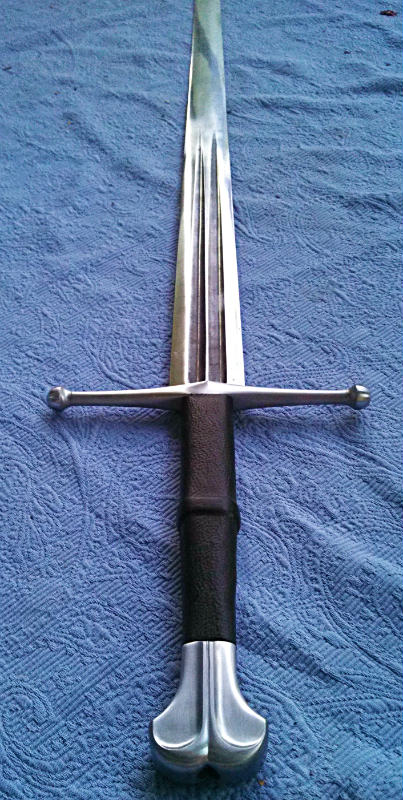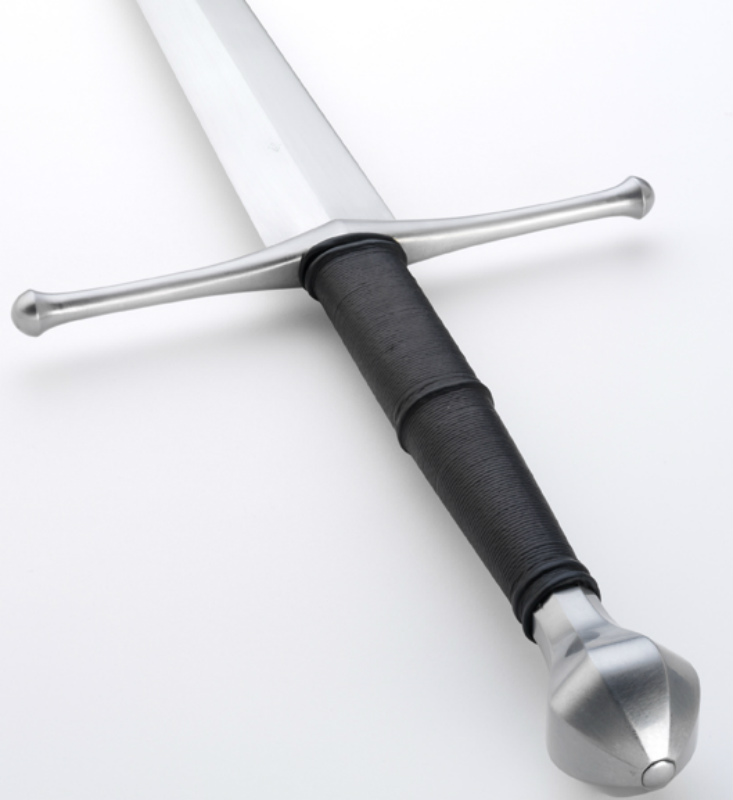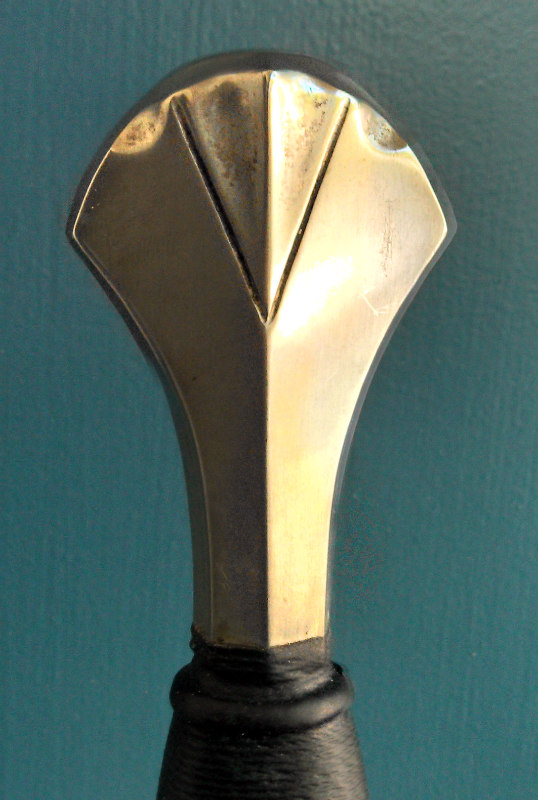Posts: 4 Location: London
Sun 11 Nov, 2018 5:23 am
Grippable Pomels for hand and a half swords.
I am looking for historical examples of this, where they are used as extensions of the grip for two handed use.
Both Aragorns and Gandalf's swords have this in Lotr.
Other detailed information on pommel design and how they relate in shape to the grip would be greatly appreciated too.
 Attachment: 288.87 KB
Attachment: 288.87 KB
[ Download ]
Posts: 159
Sun 11 Nov, 2018 1:14 pm
Welcome to the forums.
Technically most pommels from the 13th century onward can be gripped fairly comforably, with Viking and brazil nut pommels being probably the only truly impractical shapes to hold on to before the advent of basket bars blocking access to the pommel.
A disc pommel is surprisingly comfortable to grab, although it often is not its primary purpose. Especially those with a protusion and a recess in the middle (cf.
http://myArmoury.com/albums/displayimage.php?album=17&pos=4 ) provide a lot of feedback to the user and the index and ringfinger usually nestle nicely into the slopes around the protusion.
While it seems more intuitive to assume that a diamond shaped pommel like this one from Brescia (
http://myArmoury.com/albums/displayimage.php?album=17&pos=222 ) would be more comfortable to grasp, one should consider that the edges of those were often quite pointy and might not make for the most comfortable surfaces. A better example for grabbing would most likely be the middle one in this picture:
http://myArmoury.com/albums/displayimage.php?album=17&pos=288
Round and pear shaped pommels are naturally comfortable to grab, and this is very often done by HEMA practitioners at all levels of skill. It is mostly an issue of personal preference. The bottom pair in this picture (
http://myArmoury.com/albums/displayimage.php?album=17&pos=290 ) would be quite comfortable to hold on to. A round pommel does not, however, give any information or much traction towards edge alignment. A fishtail (like this one
http://myArmoury.com/images/features/pic_spotxviii15.jpg ) or flattened mushroom/pear pommel like the leftmost in this picture (
http://myArmoury.com/albums/displayimage.php?album=17&pos=296 ) would provide a nice compromise here.
Posts: 4,393 Location: Northern California
Sun 11 Nov, 2018 4:56 pm
The pommel for this Castillon sword, dating from around 1453 is very good - your hand fits comfortably into the curve.
 Attachment: 12.35 KB
Attachment: 12.35 KB
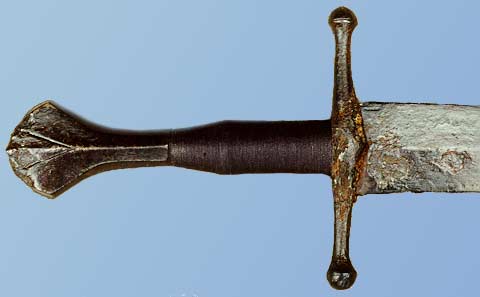
Posts: 795 Location: Wyoming
Sun 11 Nov, 2018 5:19 pm
What Roger and Johannes have said, plus have a read of the Oakshott Pommel typology found here:
http://myArmoury.com/feature_oakeshott3.html
Personally I really like T, U, V for gripping more than the wheel and disc types. Maybe type T2 is the closest to the LOTR film swords.
Posts: 4 Location: London
Mon 12 Nov, 2018 10:29 am
Thats some good info. Thank you!
I will have a good look at the links tonight :)
Ps: how do you get pictures to show up in the post, and not just as a link to be downloaded in a seperate window?
Thanks again.
Posts: 4,393 Location: Northern California
Mon 12 Nov, 2018 5:41 pm
| Simon Jackson wrote: |
Ps: how do you get pictures to show up in the post, and not just as a link to be downloaded in a seperate window?
Thanks again. |
For the picture to show up in the post, it must have no more than 800 pixels width/height. It must be no bigger than 100 KB. You can go someplace like https://pixlr.com/express/ to edit your photo to conform to those parameters.
Posts: 4 Location: London
Tue 13 Nov, 2018 2:01 am
Thank you Mr Hooper.
Posts: 630 Location: San Diego, California
Tue 13 Nov, 2018 4:25 am
| Johannes Zenker wrote: |
| While it seems more intuitive to assume that a diamond shaped pommel like this one from Brescia ( http://myArmoury.com/albums/displayimage.php?album=17&pos=222 ) would be more comfortable to grasp, one should consider that the edges of those were often quite pointy and might not make for the most comfortable surfaces. |
As the happy owner of an Albion Brescia, I can confirm that it isn't the most comfortable pommel in the world, and doesn't give great feedback as to edge alignment. Leather gloves alleviate the first issue to a great extent. Still my favorite of all the swords I own, and a superb recreation of the original, but from a user's perspective there's a noticeable difference between it and, say, a Crecy with a wheel pommel.
Last edited by Sam Barris on Tue 13 Nov, 2018 9:33 pm; edited 1 time in total
Posts: 271
Tue 13 Nov, 2018 10:13 am
I do not own a two-handed or longsword/bastard sword with a disc pommel, but I do own an Arms & Armor Grunwald with a wheel pommel, and I must say that I do not prefer to grip it with a second hand in a conventional sense. Yes, it can help with edge alignment, but I find conventional holds on such pommels to be quite uncomfortable. However, that particular weapon is no doubt a one-handed weapon of war, and two hands need to be used tactfully to be of any comfort if one uses that particular sword in that particular manner - your mileage may vary, of course.
As per scent-stoppers, I must say I really like them. I do not practice wrapping my hand the base of the pommel, so I do not encounter the sharp points as others have complained about. However, having the hand slide into the gap between the grip's termination and the middle of the pommel is very comfortable. My longsword is again made by A&A, and it uses their hex-shaped (6 sided) scent stopper which can be seen on several of their training swords. That shape, as long as it is properly oriented, perfectly fits the hand and locks the edge into alignment. So, as long as you can at least loosely hold onto "Dobringer's" teachings about not gripping the end of the pommel, scent-stoppers are very comfortable in the hand, and in my opinion, the six-sided form is optimal. If you want to grip the end, you probably need a scent with a rounded bottom for maximum control and comfort.
I would not be opposed to trying a fish-tail pommel, or other such diamond-type pommels, but I have not had the opportunity. My assumption is that they are very similar to angular scent-stoppers as I noted above. As long as you are not intent to wrap your hand around the base of the pommel, they should give you good control and comfort, and hopefully not dig into your hand like wheel pommels can if the grip is a bit too long. I should note that my angle comes from someone who is interested in studying "fundamental Liechtenauer," so some of the later material which employs winding by gripping the pommel is a bit distant from me.
Posts: 4,393 Location: Northern California
Tue 13 Nov, 2018 11:22 am
Posts: 4 Location: London
Wed 14 Nov, 2018 4:01 am
I chose an hexagonal grip/pommel profile and this is what I came out with.
A lot of the grips seem very thin in the historical examples. Is this to compensate for wearing gauntlets?
How do the dimensions look, I wanted a little bit extra, but not too much.
(I am designing larp weaponry to be made with modern resins)
 Attachment: 36.96 KB
Attachment: 36.96 KB
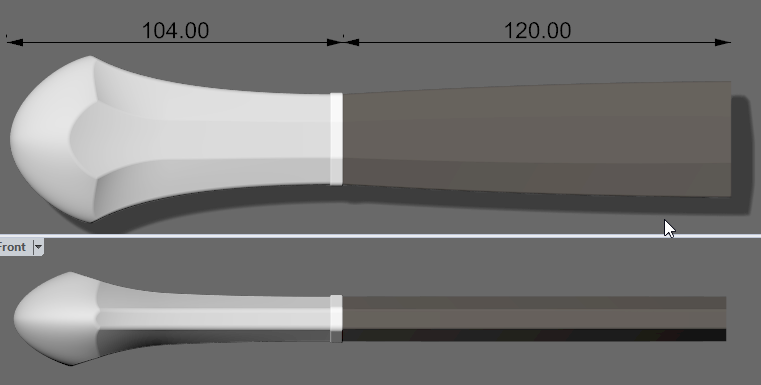
You
cannot post new topics in this forum
You
cannot reply to topics in this forum
You
cannot edit your posts in this forum
You
cannot delete your posts in this forum
You
cannot vote in polls in this forum
You
cannot attach files in this forum
You
can download files in this forum

